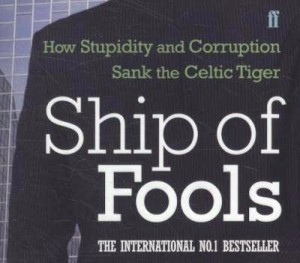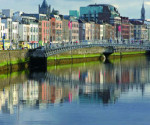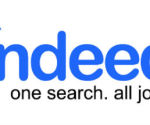‘Ship of Fools: How Stupidity and Corruption Sank the Celtic Tiger’ Review
 Having been in Ireland for over a year now, mentions of the economic plight are never far away, along with it apportions of blame to numerous figures, most notably, politicians, property developers, bankers, regulators and anyone else who gambled – and lost during the halcyon Celtic Tiger years.
Having been in Ireland for over a year now, mentions of the economic plight are never far away, along with it apportions of blame to numerous figures, most notably, politicians, property developers, bankers, regulators and anyone else who gambled – and lost during the halcyon Celtic Tiger years.
Although, people have differing views on who deserves the largest slice of blame, they unanimously agree that a golden opportunity for growth and prosperity was squandered.
Wanting to deepen my understanding of the causes behind the crisis and figure out who really was behind Ireland’s economic woes, I read the acclaimed ‘Ship of Fools: How Stupidity and Corruption Sank the Celtic Tiger’ by Irish Times stalwart Fintan O’Toole and felt compelled to pen this review.
O’Toole is well-known for his frequent baiting of the political-class, particularly those who have been guilty of ‘dig-outs’, ‘errors of judgement’ or outright corruption, and the book starts by defining Ireland’s story of growth as two distinct chapters.
Students of Irish history will know from 1995-2001 the economy grew rapidly, driven by an increase in worker output and manufacturing exports. Unemployment and poverty fell too, all of which led to a rise in GDP to a lofty 111% of the EU average, but O’Toole makes the case early on Ireland was merely catching-up with Europe, not leading it.
This new and exciting period was characterised by investment from organisations like Pfizer, Intel and Microsoft which created highly skilled, and not to mention highly paid jobs. No doubt they were enticed to set up shop thanks to favourable corporation tax, a well-educated, English-speaking workforce and proximity to London.
These factors coupled with migration giving way to immigration and the shaking off of what O’Toole termed ‘authoritarian religiously’ saw the emergence of a feel good factor in the Irish psyche. The key point O’Toole makes is that despite the headlines about impressive percentage growth, it was from a low starting point.
Whilst huge changes were afoot, some things remained and the author makes the case that cronyism, self-interest, and corruption was not only tolerated, but allowed to fester, thanks to light touch regulation and toothless enforcement. O’Toole draws on the evasion of Deposit Interest Retention Tax (DIRT) and the Ansbacher tax avoidance as examples of how law-breaking had been a characteristic of the Irish elite’s behaviour.
O’Toole pins a large portion of blame on the Central Bank, which in an abdication of responsibility viewed its role as merely ensuring banks were solvent, not ethical. A huge difference. Government failure to address this issue as investment poured into the Emerald Isle undoubtedly helped foster a culture of risky and unscrupulous behaviour that set the tone and foundation for what was to come.
In hindsight, holding up this era of unprecedented growth as an example of free-market globalisation at its best, as it often was, is hugely ironic. O’Toole suggests this phase in Irish history was in fact a product of complex social, historical and political processes and sheer good fortune, rather than the nous of Bertie Ahern, who comes in for criticism for his lack of ideology, vision and latterly scandal.
The book details the second part of Ireland’s story from 2001-2006 where the economy began to slow, with growth and exports falling. Crucially, during this time manufacturing jobs were lost and replaced with construction, financial and public sector roles as signs of overheating emerged.
O’Toole states that two economies began to emerge; one in which people created goods and sold them and the second of facades and fiction. He draws the distinction that consumption replaced production as the means to keep the economy growing.
The author reveals from 2002 onwards the largest single source of Foreign Direct Investment (FDI) into Ireland was from the Netherlands, courtesy of ‘high-level financial juggling by American owned transnational corporations, with their Dutch based treasury-management subsidies routing capital flows through Dublin’.
Despite the prominence of IBM, Eli Lilly and Merck et al, the majority of FDI was channeled into the International Financial Services Centre (IFSC), a small district in Dublin with low taxation and light regulation – the latter once again rearing its head as dubious practices were allowed to flourish.
Meanwhile, the rise in house prices was huge and unsustainable; between 1994 and 2006 house prices in Dublin grew by 519%. This property bubble bore no relation to reality or wages and was primed to burst. Conversely, whilst house prices rose, what are now ‘ghost estates’ sprung up as developers continued building. For many, these abandoned shells which scar the landscape are the real legacy of the Celtic Tiger.
There is now what I would define as a third chapter of this economic story which began in 2008. It will be remembered as the year when things began to unravel for the global economy. Lehman Brothers filed for bankruptcy in September of that year and within a couple of months Ireland had its own scandal as Anglo Irish Bank found itself wildly overexposed to construction and property investments.
Controversially, the bank was deemed ‘too big to fail’, nationalised and despite protestations to the contrary, was ruled insolvent. It later emerged that Anglo Irish, as O’Toole put it had been ‘cooking its books’ with former Chairman, Sean FitzPatrick taking out a staggering €87 million in secret loans from the bank. Once again the notion of regulation was conspicuous by its absence.
O’Toole also vilifies Brian Cowen. Although, BIFFO will be remembered as the man responsible for signing the financial rescue package with the Troika of the European Union, European Central Bank and International Monetary Fund, it is his complicity in the role of Minister for Finance, a period where casino banking grew and regulation shrunk that Cowen perhaps deserves greatest censure.
Reading ‘Ship of Fools: How Stupidity and Corruption Sank the Celtic Tiger’ it is apparent how difficult and foolish pinning the blame on just one person is. The book describes in detail the myriad micro and macro-economic, cultural and technological factors that simultaneously struck to tame the Celtic Tiger, but for me, it highlights one of man’s eternal problems; that of too much power being held in the hands of just a few.
With construction bosses sitting on the boards of banks which lent freely to their companies, whilst making lavish donations to politicians as regulators sat back and did nothing, it is little wonder things turned toxic. Granted, this is an oversimplified version of events and there were more shades of grey than O’Toole concedes, but undoubtedly the Celtic Tiger was Ireland’s opportunity to usher in an era of sustainable growth, prosperity and development.
O’Toole surmises that the few, termed the ‘Golden Circle’ were allowed to ride roughshod over the dreams of a generation, not to mention saddling them with huge debt thanks to a heady concoction of incompetence, greed and criminality. Although, O’Toole uses the book to tell how the famed luck of the Irish ran out, it’s difficult to think that those responsible, those who have yet to be held to account are doing anything but riding theirs.














